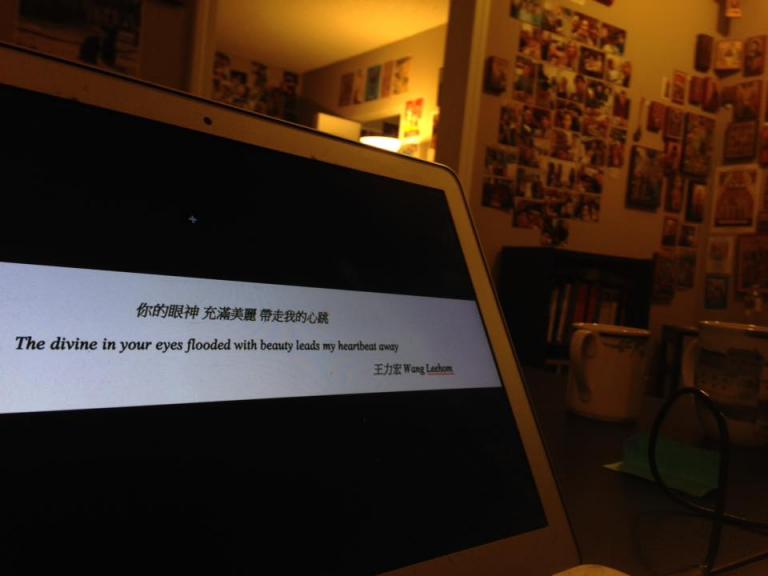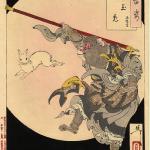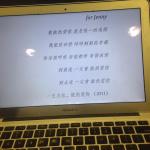
My introduction to Asian martial traditions began when I was eight. My dad and I were shopping at Costco when suddenly he stopped at the video section. Picking up two videos, he said that they were famous kung fu movies. The actor at the helm was Bruce Lee, although one of the videos spelled it ‘Bruce Le.’ I quite liked that one because it introduced what it claimed were the five animals imitated by Shaolin traditions: dragon, snake, tiger, leopard, and crane. I did not know it was a fake Bruce Lee movie and that the traditions of the Shaolin Forest were more complicated than what the film portrayed. The other movie was called The Chinese Connection. The Bruce Lee in it was faster, more ripped, and used nunchucks. He was also the real thing, although the real name of the movie is Fists of Fury, a title for which the great jazz artist Kamasi Washington has done more than justice in his recent meditative homage to the Master.
When it came to Bruce Lee, I frankly couldn’t believe my luck. Just three years before, I had had all of my Teenage Mutant Ninja Turtles paraphernalia thrown away. I had had a dream when I was five, shortly after I accepted Jesus into my heart, as the evangelical axiom goes, and it featured Donatello, my secret favourite of the turtles (my more ready admission was Michelangelo), beating me with his staff. My father, who had not yet studied psychotherapy at that point and therefore missed the Freudian possibilities of me getting whacked with a teenage turtle’s big stick, concluded that the dream was about the spirits. Splinter, he recalled, was a rat that had not only taught the turtles karate but also Zen spirituality. I did not know what that was, but it sounded bad enough to have to throw everything away, so I released all my materials as if they were emptiness.
God’s approach to you is very strict, my parents concluded about this divine policing of my consumption of popular culture. I suppose this formulation still works for me, to an extent. The next year, I was watching the Mighty Morphin’ Power Rangers on television when visitors remarked on how violent it was, which meant that I wasn’t able to continue my obsession there. A few years later, I found myself consumed by the battles of Warcraft II, and my sixth grade teacher, a Pentecostal, confronted me about the magical elements in the game, arguing that I should not be flirting with the witchcraft by which God distinguished the Canaanites from the Israelites in the Book of Deuteronomy. As for my father, one time he didn’t take a job because he had a dream about the employer’s office statue of Guan Gong expanding and chasing him down the hall, which was a blessing in disguise because he later discovered that that firm’s ethical standards when it came to building construction was something to be desired.
As I became a teenager, I learned that these stories were important for the writing of my testimony, an account of how God saved me. It was important for me to have these memories, silly as they might sound, because they were evidence, however tenuous, that I was a subject of divine salvation. I had grown up in a Christian home, one that didn’t believe in baby baptism. Conversion stories in such settings are even less convincing than they are in other cases, and having these acts of intervention into my popular consumption filled in the gaps.
Later on in my life, I came to see that God also seemed very selective about what to prevent me from watching. Why did he allow Bruce Lee, if not the Power Rangers? Or why could I continue with Zelda and read Lewis and Tolkien, when Warcraft II was not ok? And if the Zen Buddhism in the Turtles was problematic, then why not the New Age references to Gaia in Captain Planet? There was also the question of Taekwondo, which I took that year that I learned about Bruce Lee, with a bunch of Koreans who were almost certainly Christian. I remember why my dad, a master of Hung Kuen, put me to work in a Korean martial art. Because I was becoming interested in martial arts as I watched Bruce Lee, Dad said that I should learn some, and while he was flattered when I said that he could teach me kung fu (and he did), he felt that I could learn a thing or two from somebody else too, perhaps even a different tradition from his. We had visited two studios, one in which a bunch of kids were just running around and being taught by white people, and another where a Korean auntie with a black belt had flying sidekicked the punching bag so hard that it flew into the air and almost struck the ceiling. That feat convinced my dad to enrol me on the spot. I went to that studio for a year, not understanding any of the Korean and imitating the sounds of counting the numbers so well that one time they had me lead the pledge of allegiance to the Korean flag, after which they told me that my Korean was good. I had no idea what I had said. However, after a year, the studio also closed down. Again, it was attributed to God’s strictness with me, which made no sense to me because just a few months before, I had prayed to the Lord had given my feet the strength to kick through a wooden board, and he had answered my prayer and advanced me to purple belt.
Perhaps the immaturity of the teenage testimony form can be blamed for these plot holes, but the more Eastern Catholic I become, the less inclined I am to dishonour my parents. Not only did they say that God’s approach to me was very strict, but they also verified it with a number of my Pentecostal teachers in elementary school, some of whom went on to say that God has a call on my life. I have explored that call in my life, even as far as pursuing the track toward the Anglican priesthood, and I would say that as far as I’ve run to the Catholic Church so that I’d never have to think about ordination again, I now find myself in a bizarre situation in which I so happened to join an Eastern Catholic church where we have a married priesthood. Calling, my father has reminded me over the year, cannot only be asserted, but has to be discerned and tested, and as I am finding in my own life, my vocational journey in academia has had so many twists and turns that it has taken a very skilled spiritual father to help me to discern the shape of my life so far.
The strangest part about becoming Eastern Catholic is that it has finally given me permission to revisit the theology of my childhood, which I had thought since my adolescence was deeply problematic, far too sensual and subjective, and not as ‘solid’ as theologies that were generated by white people. As I come back to my Chineseness, these stories also come back to me from my testimony, and if there is any truth in what I had said from pulpits since I was eleven, I want not to be found a liar. It has, of course, troubled me that my parents’ account of divine intervention in my popular culture tastes seems inconsistent, and while I might have been able to write that off as ironic when I was a second-generation evangelical who had turned my back on my Chineseness, this new sense of integration is incompatible with that disintegration.
Looking back on what transpired in my childhood, it seems to me that the divine strictness is wrapped up in the question of what a call is. The Lord knows that I am prone to obsession, and in interrupting my obsessions with things seemingly as trivial as popular culture, he reveals how obsessions work. For me, obsessiveness begins with a gap between what is and what could be. My life as it is, I might say, is quite boring and ordinary, suburban and quiet. I then become obsessed with finding a new story, something that can be superimposed on the ordinary. This is a fantasy, and a silly example of this might come from a time when I was nine, when I was consumed with the imagination that Disneyland really was the happiest place on earth, quite unlike boring Fremont, and I watched a video we had purchased from Disneyland obsessively, especially the section that showed all of the sequence of Fantasmic, the water and lights show where Mickey Mouse’s dreams are interrupted by Disney villains who want to give him nightmares instead. Little did I know that the key to what obsession is can be found in Fantasmic, that the dream might be asymmetrical to real life but begins to constitute it as well.
It was not the materials themselves that were the problem, then, but my use of them in relation to my everyday life as a child. The Ninja Turtles, Power Rangers, Disneyland, and Warcraft II were my exits into parallel universes, substituting the dream for real life such that it becomes reality itself. In the wake of the 2016 election, I learned from a very interesting book by Joshua Green that Steve Bannon had effectively harnessed World of Warcraft for this precise purpose. Making his money in a firm in Hong Kong off virtual gold-farmers in China for players in America, Bannon was able to speak the language of this virtual reality so well that he contributed to the creation of a new world called the alt-right. Indeed, if we are to look at the inferno of contemporary politics, anything from manifestos of incel rebellions, 4chan and 8chan conspiracies, Internet intellectuals opining about integralism while denying that they are fascists, and the cesspool that was Gamergate emerged from what might be called the second life of the Internet, the place where dreams become the real and begin to colonize reality itself. Idolatry is not really about the existence of spirits that are not the Holy Spirit; it is actually about when they are gods before the Lord our God, when their reality becomes more real than the world created by the Word.
In the way that I experience the discipline and chastisement of the Lord, I always find myself forced from such beautiful utopias into the messiness of everyday life. Incidentally, this is also the philosophy espoused by Bruce Lee, who says, Be water, my friend, and resists the colonizations of personhood by, for example in Fists of Fury, kicking the sign that says, No dogs or Chinese, sky-high and then obliterates it. Obsessed as my mother may have been with the Jin Yong novels, I have found that the legends of the Condor Heroes celebrate reality as it is in the sense of building a home on passionate love much more than the fantastic descriptions of kung-fu fighters flying in the air with swords. Lewis and Tolkien are not creating parallel universes like Warcraft; they are offering analogical worlds by which everyday life is cast in a new light so that the basic virtues of courage and loyalty, precisely those promoted by Jin Yong and Bruce Lee, can be celebrated in a technological world. There are spirits here too, Gaia even in Captain Planet, but they are not a parallel world. They are signs that the supernatural constitutes the real, and that that reality is grounded and ordered in love.
God’s approach to me is very strict, I feel like my revisitation of my childhood is telling me, because he wants me to be a scholar of everyday life. The calling here is not aspirational: I do not know whether I will ever become a deacon or a priest, although I now know that I am already a cantor, and I cannot tell from this job market whether things will eventually work out for me in a permanent way in academia, although I do know that I am publishing, teaching, and offering my intellect in service to the world. I also know that I have a sense of dutiful love, passion even, for those I love – my wife, our families, our churches, our friends, our colleagues, those in whose communities we find ourselves. In a world of aspirational fantasy and false utopias, God has repeatedly interrupted my psychic dreams and grounded me among people on the earth.
In this way, I reclaim my childhood journey alongside the way of the heart I grew up with in Chinese Christianity. From mocking my parents’ theology as attributing God with capricious inconsistency about matters as trivial as popular culture, I honour them, finding in their formulation the theological truth that perhaps the Lord wanted me to see all along. God is strict with me because he wants me to be a lover, to have two feet on the ground instead of having my head stuck in a dream world of fantasy that is more real than the people who love me. This is the chastening of love, and to these mighty acts of God in my life as a child I offer my Christian testimony.












